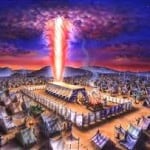The wise-hearted are the choice of G-d and not only for the physical Mishkan.
From Moshe Kempinski
In the creation of the Mishkan ( the Tabernacle) we read of “wise hearted” women and men that are called to create the artifacts of the tabernacle , “And all the women that were wise hearted ( Chochmat Lev) did spin with their hands, and brought that which they had spun, both of blue and of purple, and of scarlet and of fine linen.”( . Exodus 35:25 ) . And “And every wise hearted ( Chacham Lev) man among them that wrought the work of the tabernacle made ten curtains of fine twined linen, and blue, and purple, and scarlet: with Keruvim of cunning work made he them.”( ibid 36-8)
It is an unusual blending of knowledge ( chochma) that is usually limited and inductive and of the heart ( Lev ) which is free flowing and erratic. So what does this delicate mixture of wisdom and emotion seem to imply and why was it critical for the building of the Mishkan?
We read in the book of Ecclesiastes ( Kohellet) the following about a wise heart;
“The heart of the wise ( Lev Chachamim) is in the house of mourning, but the heart of fools is in the house of joy.”( Ecclesiastes 7:4)
Both medieval commentators, Rashi and Ibn-Ezra, explain the verse is teaching us that it is in the house of mourning that we encounter our limitations while in the house of joy we forget them. The truly wise are always aware of the fact that they are mortal and that their time is finite. Fools dance through life as if they have been gifted with immortality. The wise understand, even in the midst of joy, there is finiteness to life. As a result this makes their joy more profound than that of fools.
In his book, Mei HaShiloach, the Izhbitzer Rebbe (1800-1854) relates that, in his wiser years, King Solomon, speaks of the futility of some of life’s pursuits and mortality as a tool to help individuals find the true source of joy in this world.
“The end of the matter, when all has been heard, is fear G-d and keep His commandments, for that is the whole duty of man.”( Ecclesiastes 12:13)
When all is said and done, we are bidden to connect to the infinite purpose of creation and rise above the trivial aspect of the finite. That is what King David meant when he wrote “So teach us to count our days, that we may get us a heart of wisdom.( Levav Chochma) ( Psalms 90:12)
We live in a world where everything is defined by its immediate value and usefulness. We look for immediate gratification and for temporary pleasures. Inevitably, though, when losing sight of eternal values and destiny based goals mankind begins to flounder and fail. Pleasures become hollow and gratification empty and unfulfilling.
The Mishkan (the Tabernacle) was meant to be an eternal message. It bespoke a Presence of G-d that was ever-present. It represented a Presence that would “be there” throughout all the exiles. Even in its seeming absence it was to be “ever present”. The Mishkan , as opposed to the Temple, was never destroyed. The artifacts of the Temple needed to mirror that.
Hashem wanted people of wise hearts who would understand the eternal message of the Mishkan and who would therefore pour out of their souls into the artifacts of the Mishkan that would befit this eternal message.
In Tractate Taanit ( 23) we read of Choni the Circlemaker known as the master of prayer ,who sees an elderly man preparing to plant a carob tree. Choni asks him if he does not understand that it takes 70 years to bear edible fruit, well past his lifespan. The old man acknowledges his mortality and says that he is doing it for his future generations, just as his ancestors had planted trees for him to enjoy .
It is these type of wise hearted men and women that Hashem is looking for, as the basis for the eternal sanctuary is being established. The reborn state of Israel is becoming that vessel and it is the wise-hearted who have been gifted with the role of its establishment. Those clamoring for “peace now” can never comprehend “peace now and forever”. Those wanting immediate gratification will not come to recognize the bliss of eternal values.
Hashem is writing the last chapters of Tanach. The scroll is open, and the quill is in hand. Hashem will be using the wise-hearted wherever they may be, to be the ink and the words He is using to write those chapters.

